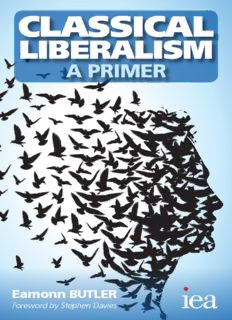
CLASSICAL LIBERALISM - Institute of Economic Affairs PDF
Preview CLASSICAL LIBERALISM - Institute of Economic Affairs
CLASSICAL LIBERALISM A PRIMER Eamonn BUTLER Foreword by Stephen Davies Classical Liberalism – A Primer CLASSICAL LIBERALISM – A PRIMER EAMONN BUTLER First published in Great Britain in 2015 by The Institute of Economic Affairs 2 Lord North Street Westminster London SW1P 3LB in association with London Publishing Partnership Ltd www.londonpublishingpartnership.co.uk The mission of the Institute of Economic Affairs is to improve understanding of the fundamental institutions of a free society by analysing and expounding the role of markets in solving economic and social problems. Copyright © The Institute of Economic Affairs 2015 The moral right of the author has been asserted. All rights reserved. Without limiting the rights under copyright reserved above, no part of this publication may be reproduced, stored or introduced into a retrieval system, or transmitted, in any form or by any means (elec- tronic, mechanical, photocopying, recording or otherwise), without the prior written permission of both the copyright owner and the publisher of this book. A CIP catalogue record for this book is available from the British Library. ISBN 978-0-255-36708-0 (interactive PDF) Many IEA publications are translated into languages other than English or are reprinted. Permission to translate or to reprint should be sought from the Director General at the address above. Typeset in Kepler by T&T Productions Ltd www.tandtproductions.com Printed and bound in Great Britain by Page Bros To my friend John Blundell (1952–2014) CONTENTS The author x Acknowledgements xi Foreword xii Summary xvii 1 Introduction 1 The purpose of this book 1 Outline of the book 1 2 What is classical liberalism? 3 Ten principles of classical liberalism 4 3 Classical liberalism: the family tree 14 Early ancestors 14 The rise of classical liberalism 16 Success and reassessment 22 The modern revival of classical liberalism 24 The diversity of classical liberal ideas 27 4 Classical liberalism and freedom 28 The arguments for freedom 28 Positive and negative liberty 34 Rights and freedoms 36 Restraints on freedom 37 vii CONTENTS 5 Classical liberal morality 38 Coercion and toleration 38 The arguments for toleration 40 Toleration and the state 47 6 Classical liberal politics 50 The origin and purpose of government 50 The myth of social justice 54 Public choice and private interests 56 The legitimacy of government 61 7 Classical liberal society 62 Spontaneous orders 62 Justice and the rule of law 65 The rationality of natural orders 69 Civil society 71 Spontaneous order and natural rights 73 8 Classical liberal economics 74 The spontaneous order of the market 74 The spontaneous ‘miracle’ of prices 74 Markets without commands 76 Rules and property 77 The arguments for economic freedom 79 The destabilising effects of government 82 Trade and protectionism 85 9 Classical liberalism today 86 Eclipse and revival 86 The rebirth of classical liberalism 87 The meaning of classical liberalism 88 Classical liberal internationalism 91 The classical liberal vision 94 viii CONTENTS 10 Key classical liberal thinkers 98 John Locke (1632–1704), English philosopher 98 Bernard Mandeville (1670–1733), Anglo–Dutch satirist 99 Voltaire [François-Marie Arouet] (1694–1778), French writer 99 Adam Ferguson (1723–1816), Scottish social theorist 100 Adam Smith (1723–1790), Scottish philosopher and economist 100 Thomas Jefferson (1743–1826), American revolutionary leader 101 Frédéric Bastiat (1801–50), French political theorist 101 Richard Cobden (1804–1865), English manufacturer and politician 102 John Stuart Mill (1806–73), English philosopher and reformer 102 Herbert Spencer (1820–1903), English anthropologist and philosopher 103 Friedrich A. Hayek (1899–1992), Anglo–Austrian political scientist 104 Ayn Rand (1905–82), Russian–American novelist and moralist 105 Isaiah Berlin (1909–97), Latvian–British philosopher 105 Milton Friedman (1912–2006), American economist 106 James M. Buchanan (1919–2013), American economist 107 Robert Nozick (1938–2002), American philosopher 108 11 Classical liberal quotations 109 Magna Carta 109 Natural rights 110 Limited government 111 Spontaneous order… 112 …Benign guidance… 113 …Versus planning and controls 114 Justice and the rule of law 115 Economic freedom 117 ix
Description: